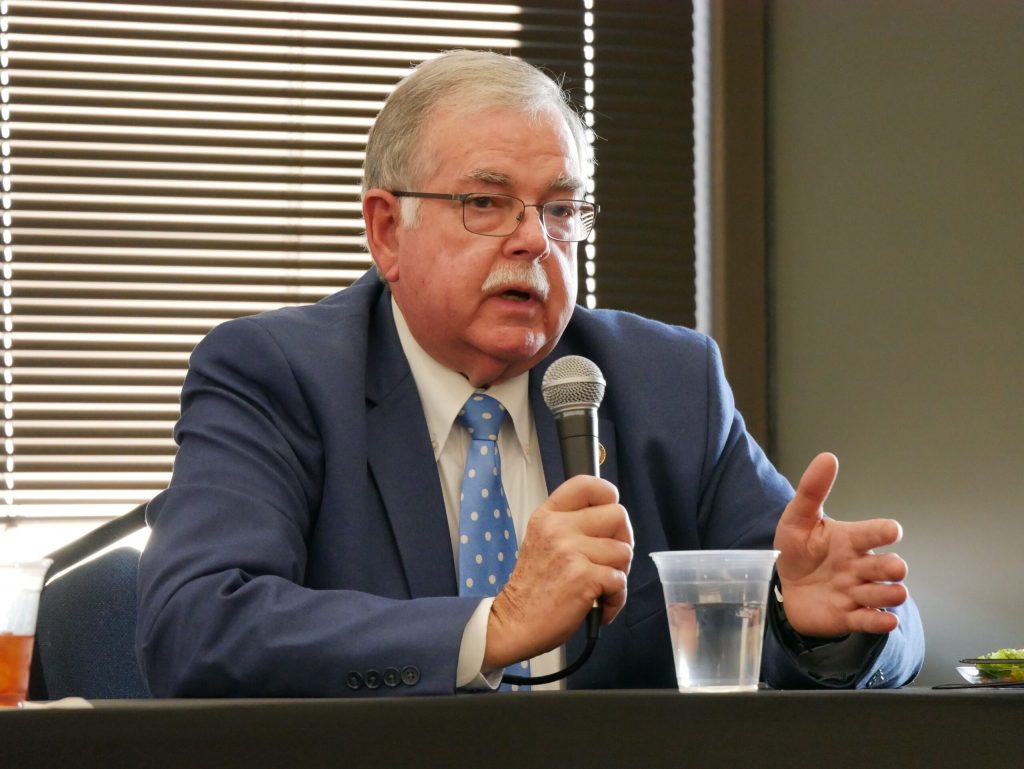Will Georgia Republicans embrace full Medicaid expansion by another name?

North Carolina state Rep. Donny Lambeth is a Republican who supported expanding Medicaid in his state long before it happened last year. Lambeth spoke at a panel discussion in Atlanta Tuesday. Jill Nolin/Georgia Recorder
Republican state Rep. Donny Lambeth backed expanding Medicaid in North Carolina for nearly a decade before it passed in that state last year.
But when he would talk about it, the former hospital executive said there was one phrase he avoided: Medicaid expansion.
“I never talked about this bill as an expansion bill,” said Lambeth, who was the primary sponsor of the bill that expanded Medicaid in North Carolina last year. “I talked about it closing the coverage gap. I talked about it as job development – a lot of things – but never did use the word ‘expansion.’”
North Carolina may have a Democratic governor, but Republicans hold a super majority in the Legislature. Gov. Roy Cooper championed expanding Medicaid under the Affordable Care Act every chance he had, complicating Lambeth’s efforts to win over his colleagues on the right, Lambeth said.
So, Lambeth focused on the economics of expansion, including the money that will flow to health care providers and the infusion of federal bonus cash available for holdout states, and he worked to convince fellow Republicans that the issue was not the political poison they believed it to be.
And when Republican lawmakers said they didn’t want North Carolina to have to pay for expansion, state officials negotiated with health care groups to pick up the state’s tab. The federal government covers 90% of the cost.
Lambeth said incorporating a job training program also helped win over some reluctant conservatives.
North Carolina received $1.6 billion as part of what Lambeth called a signing bonus. It’s a federal sweetener that was added to a pandemic relief bill passed in 2021. About $1 billion was used in North Carolina to build regional crisis centers and address other gaps in the state’s mental health system.
“We have a broken mental health system, and we had no money to fix it. So we were putting Band-Aids on mental health all across the state,” he said. “People were going to their emergency rooms and staying in for weeks because there was no place to place them. I’m sure that’s going on right here in Atlanta.”
From a financial perspective, Lambeth called North Carolina’s approach a “no brainer.”
And from a political standpoint?
“When we looked across the country, and in North Carolina, we did not find anywhere that this caused an incumbent to lose their seat. This just isn’t an issue politically,” Lambeth said.
Different states, different paths
Lambeth made these comments at a panel discussion Tuesday that was organized by BRIDGE Georgia, which is a coalition group led by a bipartisan group formed in 2022 called Georgia First. A handful of Republicans trickled in and out of the meeting.
“I encourage all of us in this space to remember that beyond political implications and political party, the folks we’re working for our fellow hardworking Georgians,” Natalie Crawford, the executive director of Georgia First and a former Habersham County commissioner who moderated the panel discussion, said to the crowd.
This discussion took place across the street from the state Capitol, where some high-ranking Republican leaders have cracked the door open to alternatives to traditional expansion that would still significantly cover more uninsured Georgians.
House Speaker Jon Burns said earlier this month a “private option” was being studied. Many Republicans have voiced support for an Arkansas-style model that uses federal funds to purchase private plans on the federal marketplace.

Rome Republican state Sen. Chuck Hufstetler (center) talks about expanding Medicaid coverage at an event in Atlanta Tuesday. Jill Nolin/Georgia Recorder
Cindy Gillespie, a former Arkansas official who led the state’s Department of Human Services, also participated in Tuesday’s panel discussion. Gillespie, who now lives in Americus, was part of an influential House study committee’s November meeting that focused on Arkansas’ approach to expanding Medicaid, causing a stir in Georgia politics.
“It’s incredibly important that if you go down this road, even if you do private insurance, even if you do a premium assistance program, you’re not going to do ‘Arkansas,’” Gillespie said. “Because you’re fundamentally different here in Georgia than Arkansas is. You will design something that actually fits Georgia and Georgia’s needs.”
Lambeth echoed that message.
“Create your own Georgia plan, so that you can be proud of what you’ve been able to create,” he said.
Georgia attracted national attention for a partial expansion plan that Gov. Brian Kemp announced in 2019 during his first year in office. That program, which launched in July after being delayed by the Biden administration, expands coverage to some low-income Georgians as long as they complete 80 hours of work, school or other qualifying activity every month.
As of December, about 2,300 people had signed up for that program. About 345,000 people are thought to be eligible, according to the state’s estimate. At the same time, hundreds of thousands of people are expected to lose Medicaid coverage as part of the ending of a federal pandemic-era protection.
Georgia is one of 10 states that have not expanded Medicaid under the Affordable Care Act, which was former President Barack Obama’s signature health care law. In Georgia, which has one of the highest uninsured rates in the country, about a half million people could gain health care coverage.
Warnock: ‘Only politics can get in the way of his happening right now’
It is widely expected that any proposal to expand health care coverage would be paired in some way with changes to the state’s health care business regulations, which has been a priority of Republican Lt. Gov. Burt Jones. In North Carolina, a similar deal was struck.
Jones still signaled an openness to the concept of Medicaid expansion when talking to reporters Monday.
But nearly four weeks into the legislative session, no specifics have materialized and no bill has been filed. Crossover Day, when a bill must clear one chamber to have a smooth path to the governor’s desk, is set for Feb. 29.

U.S. Sen. Raphael Warnock talks to reporters at the state Capitol Tuesday. Jill Nolin/Georgia Recorder
Sen. Chuck Hufstetler, a Rome Republican who has long supported expanding Medicaid and who was also part of Tuesday’s panel discussion, told reporters afterwards that there’s still time for it to happen this year.
Still, there is much work left to do to convince holdouts to support it, Hufstetler said.
“It’s a hugely complex issue, and most people just don’t understand it,” he said. “And they also forget that these people we’re talking about are not unemployed people. These are the working poor.”
Hufstetler argues expanding coverage would mean a healthier workforce, which is needed to support Georgia’s growing economy. He also noted that North Carolina has been able to cut its income tax rate more aggressively than Georgia.
“We’ve got to be the No. 1 state for health, for education and for business climate to move forward,” he said. “We can’t say, ‘Well, we’ve had a great few years’ and just relax. It’s a constant market to compete in, and the South is very competitive.”
The Senate Finance Committee Chairman said Georgia leaders are being “pennywise and pound foolish” not to move forward.
U.S. Sen. Raphael Warnock, who made his first official visit to the state Capitol Tuesday, reminded lawmakers of the federal incentive packed into the American Rescue Plan Act available if Georgia does decide to move forward with expanded coverage.
“If we can find a bipartisan path to getting this done, there’s $1.2 billion sitting there for the citizens of Georgia to make the glide path easier to get Medicaid done for working families in Georgia,” Warnock said to the state Senate. “And so I hope we can find a way to do it.”
When asked for his thoughts about Georgia potentially expanding Medicaid through a private option instead of traditional expansion, Warnock said he would avoid wading “into the weeds.”
“There’s a great deal of negotiation that has to happen here. I just hope that at the end of the day, that we will center the people rather than the politics. Only politics can get in the way of this happening right now, and I think that would be a shame,” Warnock said.
SUPPORT NEWS YOU TRUST.
The post Will Georgia Republicans embrace full Medicaid expansion by another name? appeared first on Georgia Recorder.



